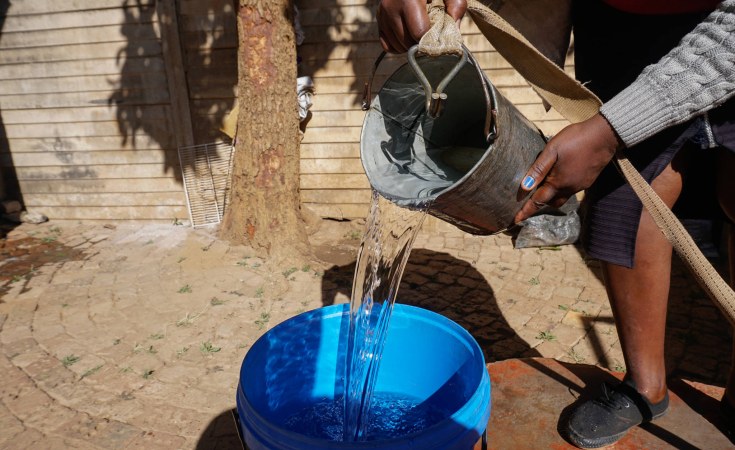In February 2024 the World Health Organization announced southern Africa was suffering the deadliest regional outbreak of cholera in at least a decade. At the epicentre of the disaster were Malawi, Zimbabwe and Mozambique, where cholera cases surged more than four-fold between 2022 and 2023. Over 1,600 deaths were reported in the three countries.
Already 2024 is threatening to be another devastating year for cholera in the region as warmer weather and unusually heavy rains and storms have fuelled the disease's spread. Zimbabwe, Mozambique and Malawi have reported more than 13,000 cases of the disease so far in 2024.
Cholera bacteria are spread by eating or drinking food or water contaminated by the faeces of an infected person. Oral vaccines help contain outbreaks and limit the spread of the disease. But there is a worldwide shortage of the vaccines.
From January 2023 to January 2024 there were urgent requests for 76 million doses of the oral cholera vaccine from 14 nations. Only 38 million doses were available. Stockpiles ran dry at the beginning of 2024.
Nadine Dreyer spoke to vaccinologist Edina Amponsah-Dacosta about the impact of the vaccine shortages and what is being done to secure stockpiles for future outbreaks on the continent.
The world's oral cholera vaccine stockpile has run dry. Why?
Unlike routinely administered vaccines, such as those for measles, the cholera vaccine is developed on a needs basis: during outbreaks and humanitarian crises, for example.
There's limited funding to purchase cholera vaccines, and as a result there's limited production.
There is only one vaccine recommended for mass vaccination during cholera outbreaks, Euvichol-Plus.
The vaccine is manufactured exclusively by EuBiologics, a global biopharmaceutical company based in Seoul in South Korea.
The company has limited manufacturing capacity. So when there is a spike in the need for the vaccine, demand outstrips production.
So there is usually only a limited stockpile available.
Traditionally we haven't had several countries experiencing outbreaks at the same time like we are currently seeing in southern and eastern Africa as well as in parts of the eastern Mediterranean, the Americas and south-east Asia.
This is one of the main reasons for the current shortage.
EuBiologics has identified certain steps in the manufacturing process that could be refined and shortened, while ensuring that the vaccine remains safe and effective.
A low-cost, simplified version, Euvichol-S, has been approved by the World Health Organization and will help ease the shortage. Over 15 million doses of Euvichol-S are expected in 2024.
What is being done about the vaccine shortage in southern Africa?
There have been several strategies to fight the outbreak.
Firstly, in October 2022 the WHO temporarily suspended the standard two-dose vaccination regimen in favour of a single dose to stretch existing supplies.
Two doses provide up to two or three years' protection, but one dose is still safe and effective. With one dose we're able to deliver some level of safety up to one year or just a little bit more, hopefully enough time to beat the current outbreaks.
Secondly, countries like Zambia and Zimbabwe have taken steps to prioritise vaccine distribution to areas that need them the most.
An example of a priority area would be one devastated by droughts or floods with a high transmission rate and no access to safe drinking water and sanitation.
Last year, cholera cases surged in Malawi and Mozambique following Cyclone Freddy, the longest-lived tropical cyclone in history. It traversed the southern Indian Ocean for more than five weeks in February and March.
Is progress being made to develop more cholera vaccines?
In Africa less than 1% of doses of all vaccines are locally manufactured.
During the COVID-19 pandemic African countries were forced to the back of the queue for life-saving COVID-19 vaccines. It taught us that we need to have our own local manufacturing capacity.
In the case of cholera we are seeing that we cannot rely on just one manufacturer in South Korea when most of the outbreaks are happening in several African countries.
The problem has been recognised and there are steps to rectify it. There has been a lot of investment in expanding the cholera vaccine manufacturing capacity.
Two manufacturers are coming into play globally, one in South Africa and one in India.
Biovac, a biopharmaceutical company based in Cape Town, has received investment capital to develop vaccinations for cholera and other diseases.
It has concluded a ground-breaking licensing and technology transfer agreement with the International Vaccine Institute, a non-profit international organisation headquartered in South Korea, for the manufacture of the vaccine.
The first batch of vaccines will undergo clinical trials from 2024 to 2025, with licensing expected from 2026. This means we won't see locally manufactured cholera vaccines until after 2026.
In India, pharmaceutical company Biological E plans to manufacture the simplified version of Euvichol-plus.
But vaccination is not a replacement for the provision of safe drinking water, adequate sanitation, and good hygiene practices.
Edina Amponsah-Dacosta, Research Officer / EIDM Specialist, University of Cape Town


